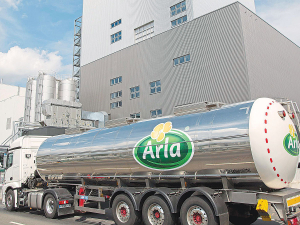Arla Foods delivers $15b revenue as Co-op turns 25
European dairy giant Arla Foods celebrated its 25th anniversary as a cross-border, farmer-owned co-operative with a solid half-year result.
 Arla Foods is owned by more than 8400 farmers from Denmark, Sweden, the UK, Germany, Belgium, Luxembourg and the Netherlands.
Arla Foods is owned by more than 8400 farmers from Denmark, Sweden, the UK, Germany, Belgium, Luxembourg and the Netherlands.
European dairy co-operative Arla Foods is forecasting a total revenue of nearly $25 billion this year.
The farmer-owned milk processor says that while geopolitical tensions continue, the positive trend on consumer purchasing power from the first half of 2024 should prolong into the second half, especially in Europe as inflationary pressure continues to subside and wages increase.
"This is anticipated to translate into a continued upturn in the demand for dairy, although it is uncertain how consumers will react to the expected higher retail price levels following the commodity price increases," Arla says.
"The uncertainty is also underlined by a lesser volume of available milk on a global level."
Arla Foods is owned by more than 8400 farmers from Denmark, Sweden, the UK, Germany, Belgium, Luxembourg and the Netherlands. The co-op is one of the leading players in the international dairy arena with well-known brands like Arla, Lurpak, Puck and Castello.
For half-year ending June 30, 2024 Arla Foods reported total revenues of almost $12 billio and achieved a net profit of $300m. For the six months, Arla collected 7 billion kg of milk.
Peder Tubough, Arla Foods chief executive says it has delivered a robust half-year performance in 2024 where the positive trajectory from the later part of 2023 has continued.
The performance allowed Arla to increase the milk price by nearly 10c/kg of milk, compared to the second half of 2023 and pay a half-year supplementary payment to farmer owners of 3.5c/kg of milk, based on the half-year volumes.
"We are satisfied that the momentum created by our farmer owners and employers in 2023 has continued into 2024, and today Arla is able to announce a robust half-year result with a competitive milk prices that paves the way for enhanced sustainability efforts going forward," says Tubough.
He notes that the rising milk price and the half-year supplementary payments are mainly driven by rising commodity prices, Arla's Fund Our Future transformations & efficiency programme and a return to branded volume growth.
Arla's strategic brands had a volume driven revenue growth of 4.1% in the first half of 2024 compared to a decrease of 6.0% in the first half of 2023.
The growth was spearheaded by the Lurpak, Puck and Arla brands which respectively grew volumes by 7.9%, 4.4% and 3.8% in the first half of 2024.
"We are very pleased to deliver a competitive milk price.
"At the same time, the return to branded growth happened with a higher magnitude than expected due to the strength of our brands and successful efforts to regain growth, so we are on a positive trajectory."
Donald Trump's latest tariff tantrum has again thrown the world of trade into a new round of turmoil and uncertainty, and NZ is caught up in it.
The third edition of the NZ Dairy Expo, held in mid-February in Matamata, has shown that the KISS principle (keep it simple stupid) was getting a positive response from exhibitors and visitors alike.
Twenty years ago, South African dairy farm manager Louis Vandenberg was sent to a farm in Waikato to provide training on Afimilk technology.
Strong farmgate milk price is helping boost investment on farms, says PGG Wrightson chief executive Stephen Guerin.
Fonterra's 460 milk suppliers in Australia, who will switch to Lactalis end of this month, are unfazed with the impending change.
The 5+ A Day Charitable Trust has launched a collection of affordable recipes designed to turn everyday vegetables into seasonal stars.
OPINION: Is it a case of over promising and under delivering? Farmers think so.
OPINION: The UK dairy industry is celebrating a win after plant-based drink maker Oatly lost a long-running legal battle over…